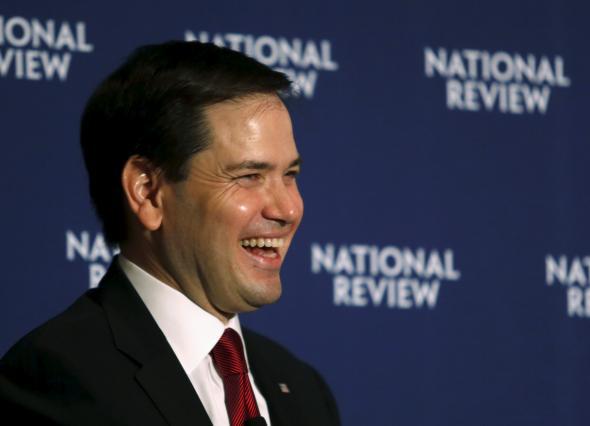Florida senator and 2016 presidential candidate Marco Rubio tweeted Tuesday that he’s excited to see the movie Straight Outta Compton, a biopic about the ‘80s L.A. rap group NWA.
If you’ve followed Rubio’s public statements, his enthusiasm for the movie isn’t surprising—he’s called “Straight Outta Compton” (the song) one of his three favorite rap tracks and generally seems to have a broad knowledge of hip-hop history.
Rubio and NWA are an odd match—for fairly obvious reasons. Rubio is a cheerful Republican politician, and NWA were angry obscenity-case rappers whose name stands for Niggaz Wit Attitudes. “Straight Outta Compton” itself is a celebration of killing people with automatic weapons, getting “pussy,” and referring to women using such terms as “slut,” “bitch,” and “dirty-ass ho.”
It’s not really that unusual for a politician to praise a song that tends to undermine that politician’s stated ideals and/or an artist who would never vote for him. It’s also possible to enjoy a work of art while being uncomfortable with some of the attitudes that art expresses, and to understand that artists sometimes adopt personas that don’t reflect their true beliefs about moral behavior. (To the best of anyone’s knowledge, for instance, Ice Cube has never actually killed any “punk motherfuckers” with a machine gun.) Rubio furthermore isn’t using “Straight Outta Compton” as his official campaign song or claiming it represents his views—he’s just saying he likes it.
Still, I can’t help but wonder if Rubio understands the depth of the dissonance here—which, in short, is about the legacy of Ronald Reagan. Marco Rubio loves Reagan. He’s often compared (by his supporters) to Reagan and is happy to encourage those comparisons. Here’s part of a speech he gave in 2011 at the Reagan Presidential Library in California:
I tell people all the time that I was born and raised in Ronald Reagan’s America. I was raised in Ronald Reagan’s America. He was elected when I was in fourth grade and he left office when I was in high school. Those are very important years, fourth grade through high school, they were the years that formed so much of what today what I believe and know to be true about the world and about our nation.
The members of NWA were also born and raised in Ronald Reagan’s America. Reagan was the governor of California when they were children and the president when they were teenagers and young men. For them, Reagan’s America was not a good one. More than any other American leader, Reagan was responsible for popularizing resentment of welfare recipients and creating the modern war on drugs. As president, he treated poor black people as threats to be governed with force. And whether or not you think Reagan’s actions were justifiable, it’s impossible to deny that they are exactly what NWA was angry about. The song that followed “Straight Outta Compton” on its album release was called “Fuck Tha Police.” The first movie Ice Cube appeared in, 1991’s Boyz n Da Hood, uses Reagan/Bush campaign posters as an ironic emblem of destitution. Ice Cube has said often that he blames Reagan-era budget cuts to sports and after-school programs for leaving children growing up in his neighborhood with few ways to pass the time besides getting involved with the drug trade. And he’s said “Reaganomics” will be specifically addressed in the Straight Outta Compton film that Rubio is clearing his schedule for.
The contrast between Rubio and his favorite rappers’ views of Ronald Reagan is not just academic. The legacy of Reagan’s criminal justice policies—which were for the most part also Bill Clinton’s criminal justice policies—is now one of the U.S.’s most pressing issues. President Obama’s Justice Department has made major attempts to reduce racially biased sentencing disparities and prevent police brutality, while just last week Obama announced that he would like to reduce the number of people in prison and improve the way they are treated. The next president is going to have to decide whether to continue, accelerate, or reverse Obama’s reforms.
Marco Rubio likes gangster rap because gangster rap is fun and cool. Given that he’s a politician, it’s also probably crossed his mind that talking about rap might make him appealing to voters who don’t have much affection for his actual policies. But gangster rap, for all its crassness and adrenaline, was politically conscious music. Some of it is what you might judiciously call “irresponsible,” but some of its goals are similar to the goals shared by many young people today—and by many of the politicians who represent them. Rubio, on the other hand, has a reputation as a criminal justice traditionalist even within the Republican Party. He doesn’t believe there’s any “responsible way” to recreationally use marijuana and, though he’s condemned civil asset forfeiture, he has largely declined to join those in the GOP who have been critical, post-Ferguson, of police overreach. He is, at heart, a “tough on crime” Reaganite. Criminal justice reform, he’s written, “should not begin with careless weakening of drug laws that have done so much to help end the violence and mayhem that plagued American cities in prior decades.” And that’s not a sentiment you’re likely to hear coming out of Compton.
